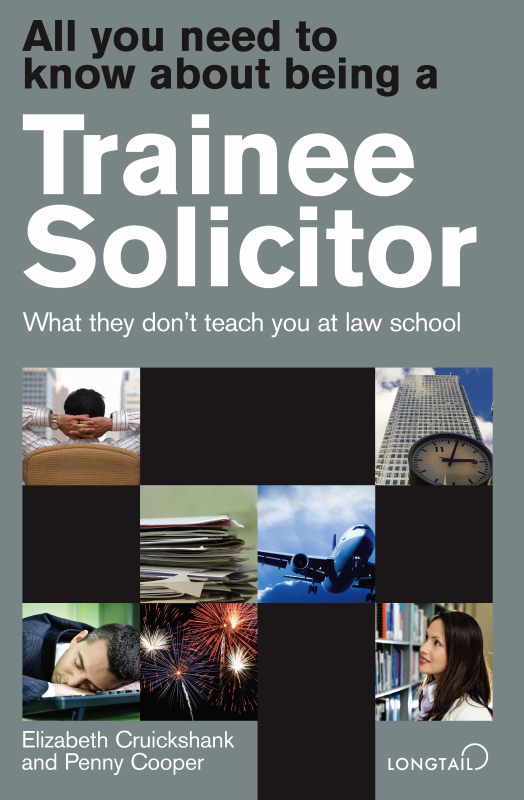Being a vacationer – Penny Cooper & Elizabeth Cruikshank
 Your vacations may seem a long time away when you are getting to grips with the new social and working environment of Law School, but now is the time to be applying for a vacation placement. Placements are on offer for Christmas 2009, Easter 2010 and Summer 2010.
Your vacations may seem a long time away when you are getting to grips with the new social and working environment of Law School, but now is the time to be applying for a vacation placement. Placements are on offer for Christmas 2009, Easter 2010 and Summer 2010.
Why you should
Swamped with applications for an ever decreasing number of training contracts firms want to be sure of your motivation and that you have some idea of what being a solicitor entails. Any work experience demonstrates that you know more about life than being a student, but work experience in a law firm will give you a head start.
Even getting a vacation placement is an achievement in itself. Some students are fortunate enough to obtain more than one, which gives them the opportunity to see several different law firms at work. But even one will look good on your CV when making applications for the training contract itself.
How to get one
Take a look at www.prospects.ac.uk UK graduate careers web-site. This lists 16 of the larger firms which offer vacation placements, with number of placements, times of the year on offer, salary and preferred method of application. You will find a more extensive list on www.lawcareers.net, with click throughs to the firms listed. This site suggests placements you might not have thought of such as the Government Legal Service, various local authorities and some smaller firms (living in your home town with your parents can cut costs!)
Firm sites indicate whether you should apply online or write or telephone for an application form. Your application and even the letter where you ask for a form must be well-written, immaculately presented and with no silly mistakes, such as misspelling common words or worse still, the name of the firm. The application form will be sufficient for most firms, but some of the larger firms will ask you to attend for interview.
If you are not getting anywhere with the standard route, you have nothing to lose by phoning unlisted smaller firms and simply asking them politely if you could do some work for them for a week or two. You are unlikely to be paid for this and they will not have a formal scheme in place, but it is experience and on your CV it spells Determination.
What to expect
First of all take it very seriously; it’s not a jolly. Contrary to firms’ marketing prose, the solicitors to whom you are allocated may be too busy to give you any meaningful work, but grab every opportunity to be helpful, even if it’s filing, finding a list of articles from the library or ensuring the tea and coffee is ready for a client meeting. You may or may not be assessed on your performance, but you will certainly get an adverse report if you treat the two weeks that you are at a law firm as down time. Attend all the departmental or firm-wide seminars you can. Although it may all seem above your head, you will get a better idea not only of what interests practising lawyers but of how firm politics and pecking orders work.
If you are taken to a meeting, always take a notebook and pen with you — and take notes. The lawyer who took you may suddenly ask if you remember a case that was mentioned, the number of employees in the client firm or a legislative reference; or you may suddenly be asked to prepare a note of the meeting because the solicitor is too busy. In Law as in life it pays to be prepared and to get the facts down on paper.
Don’t get caught out
Larger firms may entice by describing the social life available. But be careful with both your mouth and your alcohol intake. Don’t overindulge in gossip or in drinking. Don’t make or repeat disparaging comments about other people, because you don’t know who is whose best friend.
You may well notice on your placement that alcohol is abundant when lawyers entertain clients or socialise among themselves. Alcohol dependency is a problem in the legal profession and is part of the reason that LawCare was set up in 1997 to help solicitors. Don’t drink too much or do or say something silly. Remember that however friendly your temporary colleagues are, the Law is a surprisingly small world and if you have been particularly foolish while under the influence, far too many people will hear about it.
After your placement make notes to clarify your thoughts on the experience and have as an aide-memoire if you are subsequently interviewed for a training contract with your placement firm. Compare notes with friends on placements in other firms. This could give you valuable insights into how to frame your applications for contracts at those firms. This sort of note-making is exactly what you will be doing when you first meet a client and need to record your impressions for future reference.
Above all treat this whole process as part of your training to be a solicitor, from the initial research through writing and observation to final summary. It’s what a solicitor does.
This article is the second in a series for future trainee solicitors. Professor Penny Cooper is an Associate Dean at The City Law School and, together with Elizabeth Cruickshank, is the author of ‘All you need to know about being a Trainee Solicitor’ (Longtail, 2008).
